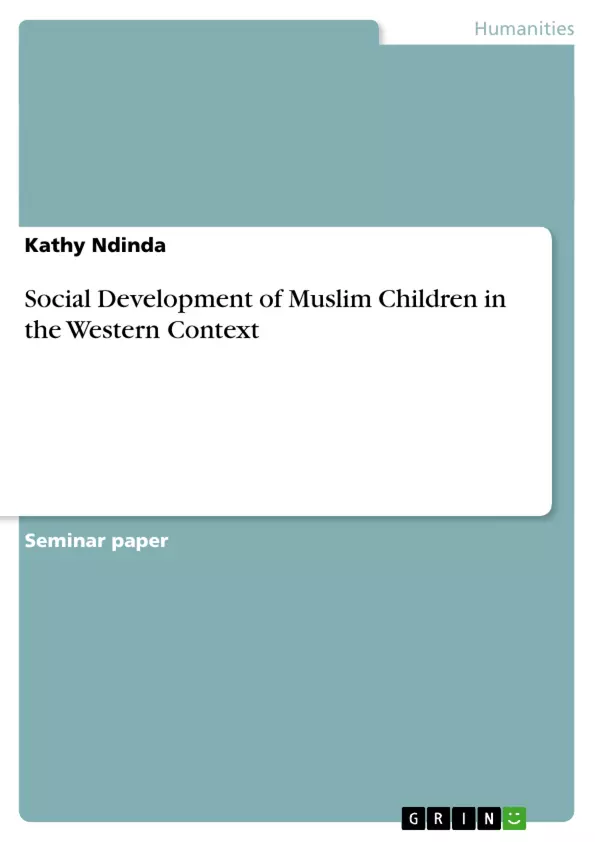Within the perspective of social and behavioral sciences, the study of socialization (or social development) has occupied a central space. A commonly accepted definition of socialization has been given by Brim. (Ahmad and Szpara 295-301)
In his definition, Brim has stated that, socialization can be defined as a process through which the individuals acquire necessary skills, abilities and disposition that enable them to become an effective or ineffective part of the society. (Ahmad and Szpara 295-301)
In the Islamic context, the process of socialization is entirely guided by the laws and regulations that are dictated in the Holy Quran and Sunnah. The process of social development of Muslims become very complex when it occurs in a non-Muslim or western context. (Imtiaz 1-5)
This complexity is attributable to the following three major factors:
• The intercultural differences and the difference in the core beliefs that Muslim children confront in the Western society. (Ahmad and Szpara 295--301)
• The difference between the teachings that Muslim children receive from their families and educational institutions. (Halstead 312-326)
• The deteriorating image of Islam and Muslims after the attacks of 11th September 2001 and the negative image of Muslims constructed by the western media. (Reed 1-18) [...]
Inhaltsverzeichnis (Table of Contents)
- Introduction
- Social Development of Muslim Children
- Key Differences in Core Beliefs
- Difference in Teachings from Families and Educational Institutions
- The Impact of 9/11 and the Western Media on Social Development
Zielsetzung und Themenschwerpunkte (Objectives and Key Themes)
This text aims to explore the complex process of social development for Muslim children raised in Western contexts. It examines the challenges and complexities they face due to cultural differences, contrasting beliefs, and the impact of external factors like media representations.
- The influence of intercultural differences and contrasting beliefs on Muslim children's social development.
- The impact of diverging educational and familial teachings on shaping Muslim children's identities and social experiences.
- The significant role of the Western media, particularly after the events of 9/11, in constructing negative stereotypes and influencing social perceptions of Muslims.
- The challenges and adaptations faced by Muslim children as they navigate the complexities of dual cultural identities and societal expectations.
- The impact of social exclusion and discrimination on the integration and well-being of Muslim children in Western societies.
Zusammenfassung der Kapitel (Chapter Summaries)
The introduction sets the stage by defining socialization and highlighting the complexities of this process for Muslim children raised in the West. It identifies three key factors contributing to these complexities: intercultural differences, conflicting teachings, and the negative portrayal of Muslims in Western media.
The second chapter delves into the core differences in beliefs between Islamic and Western perspectives. It explores how these disparities, particularly in moral values, religious views, and social constructs, can create friction in the social development of Muslim children.
The third chapter focuses on the discrepancy between the teachings received by Muslim children from their families and those encountered in Western educational institutions. It highlights the differing approaches to parenting, values, and societal norms, creating potential conflict and confusion for Muslim children.
The final chapter examines the profound impact of the 9/11 attacks and subsequent media representations on the social development of Muslim children in Western societies. It explores the emergence of negative stereotypes, social exclusion, and the challenges faced by Muslim children in navigating these complex social dynamics.
Schlüsselwörter (Keywords)
The primary keywords and focus topics include: social development, Muslim children, Western context, intercultural differences, core beliefs, Islamic teachings, Western education, media representation, social exclusion, identity formation, integration, and multiculturalism.
Frequently Asked Questions
What defines the process of socialization for Muslim children?
In an Islamic context, socialization is guided by the Quran and Sunnah, focusing on acquiring skills to become effective members of society according to these laws.
Why is social development complex for Muslims in Western contexts?
Complexity arises from intercultural differences, contrasting core beliefs, and the discrepancy between family teachings and Western educational systems.
How did the events of 9/11 impact Muslim children in the West?
The attacks led to a deteriorating image of Islam and the construction of negative stereotypes in Western media, often resulting in social exclusion for children.
What are the key differences in core beliefs mentioned?
The document highlights disparities in moral values, religious views, and social constructs between Islamic teachings and Western societal norms.
What is Brim's definition of socialization?
Socialization is defined as a process through which individuals acquire the necessary skills and dispositions to become an effective part of their society.
- Quote paper
- Kathy Ndinda (Author), 2011, Social Development of Muslim Children in the Western Context, Munich, GRIN Verlag, https://www.grin.com/document/270028



